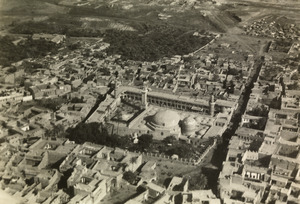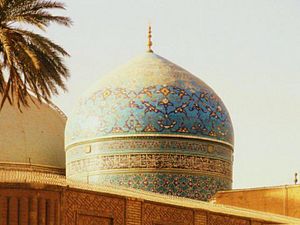Abdul Qadir Gilani facts for kids
Quick facts for kids Abdul Qadir Gilani |
|
|---|---|
 |
|
| Religion | Islam |
| Denomination | Sunni |
| Personal | |
| Born | March 23, 1078 CE (1 Ramadan, 470 AH) Gilan, Seljuk Empire |
| Died | February 21, 1166 CE (11 Rabi' al-Thani, 561 AH) (aged 87). Baghdad, Abbasid Caliphate |
| Resting place | Baghdad, Iraq |
| Children | Abdul Razzaq Gilani |
| Senior posting | |
| Title | Shaykh al-Islam |
| Influenced | Abdul Razzaq Gilani, Mu'in al-Din Chishti, Shihab al-Din 'Umar al-Suhrawardi, Sayyid Mir Jan, Al-Nawawi, Salah al-Din al-Ayyubi, Madar Ahmed Shirwac, Uways al-Barawi, Abadir Umar ar-Rida, Al-Zaylaʽi |
ʿAbdul Qādir Gīlānī, (Persian: عبدالقادر گیلانی, Arabic: عبدالقادر الجيلاني, Turkish: Abdülkâdir Geylânî, known by admirers as Muḥyī l-Dīn Abū Muḥammad b. Abū Sāliḥ ʿAbd al-Qādir al-Gīlānī al-Ḥasanī wa'l-Ḥusaynī, was a Hanbali Sunni Muslim preacher, ascetic, mystic, jurist, and theologian, known for being the eponymous founder of the Qadiriyya tariqa (Sufi order) of Sufism.
He was born on 29 Sha'ban 470 AH (March 23, 1078) in the town of Na'if in Gilan, Iran, and died on Monday, February 21, 1166 (11 Rabi' al-Thani 561 AH), in Baghdad. He was a Persian Hanbali Sunni jurist and Sufi based in Baghdad. The Qadiriyya tariqa is named after him.
Contents
Name
The honorific Muhiyudin denotes his status with many Sufis as a "reviver of religion". Gilani (Arabic al-Jilani) refers to his place of birth, Gilan. However, Gilani also carried the epithet Baghdadi, referring to his residence and burial in Baghdad.
Family background
Gilani's father, Abu Saleh, was from a Sayyid lineage, tracing his descent from Hasan ibn Ali, a grandson of the Islamic prophet Muhammad. Abu Saleh was respected as a saint by the people of his day, and was known as Jangi Dost (meaning "fight-lover" in Persian), which was originally his father's sobriquet. Gilani's mother, Ummul Khair Fatima, was also a Sayyid, having been a descendant of Muhammad al-Jawad, himself descended from Husayn ibn Ali, the younger brother of Hasan.
Education
Gilani spent his early life in Gilan, the province of his birth. In 1095, at the age of eighteen, he went to Baghdad. There, he pursued the study of Hanbali law under Abu Saeed Mubarak Makhzoomi and ibn Aqil. He studied Hadith with Abu Muhammad Ja'far al-Sarraj. His Sufi spiritual instructor was Abu'l-Khair Hammad ibn Muslim al-Dabbas. (A detailed description of his various teachers and subjects are included below). After completing his education, Gilani left Baghdad. He spent twenty-five years wandering in the deserts of Iraq.
School of law
Al-Jilani belonged to the Shafi'i and Hanbali schools of law. He placed Shafi'i jurisprudence (fiqh) on an equal footing with the Hanbali school (madhhab), and used to give fatwa according to both of them simultaneously. This is why al-Nawawi praised him in his book entitled Bustan al-'Arifin (Garden of the Spiritual Masters), saying: "We have never known anyone more dignified than Baghdad's Sheikh Muhyi al-Din 'Abd al-Qadir al-Jilani, may Allah be pleased with him, the Sheikh of Shafi'is and Hanbalis in Baghdad."
Later life
In 1127, Gilani returned to Baghdad and began to preach to the public. He joined the teaching staff of the school belonging to his own teacher, al-Mazkhzoomi, and was popular with students. In the morning he taught hadith and tafsir, and in the afternoon he held discourse on the science of the heart and the virtues of the Quran. He was said to have been a convincing preacher and converted numerous Jews and Christians. He was able to reconcile the mystical nature of Sufism with the sober demands of Islamic Law.
Death and burial
Gilani died on 21 February 1166 (11 Rabi' al-Thani 561 AH) at the age of 87. His body was entombed in a shrine within his madrasa in Babul-Sheikh, Rusafa on the east bank of the Tigris in Baghdad, Iraq.
During the reign of the Safavid Shah Ismail I, Gilani's shrine was destroyed. However, in 1535, the Ottoman Sultan Suleiman the Magnificent had a dome built over the shrine, which still exists.
Birthday and death anniversary celebration
1 Ramadan is celebrated as Gilani's birthday while his death anniversary is on 11 Rabi' al-Thani, although some scholars give 29 Sha'ban and 17 Rabi' al-Thani as his birth and death days. In the Indian subcontinent, his ‘urs, or death anniversary, is called Giyarwee Shareef, or Honoured Day.
Books
- Kitab Sirr al-Asrar wa Mazhar al-Anwar (The Book of the Secret of Secrets and the Manifestation of Light)
- Futuh al ghaib (Secrets of the unseen)
- Ghunyat tut talibeen (Treasure for seekers) غنیہ الطالیبین
- Al-Fuyudat al-Rabbaniya (Emanations of Lordly Grace)
- Fifteen Letters: Khamsata 'Ashara Maktuban
- Fuyuz e Yazdani
- Kibriyat e Ahmar
- A Concise Description of Jannah & Jahannam
- The Sublime Revelation (al-Fatḥ Ar-rabbānī)
See also
 In Spanish: Abdul Qadir Gilani para niños
In Spanish: Abdul Qadir Gilani para niños



